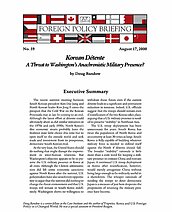At the very least, the United States should do nothing that might disrupt the improvement in inter‐Korean relations. But Washington’s objective appears to be to preserve the U.S. military presence in Korea at all costs. Although the Clinton administration did lift some economic sanctions against North Korea after the summit, U.S. policymakers have also seized every opportunity to argue that the summit did nothing to change the threat environment and that U.S. troops will remain in South Korea indefinitely. Washington shows no willingness to withdraw those forces even if the current détente leads to a significant and permanent reduction in tensions. Indeed, U.S. officials suggest that the troops should remain even if reunification of the two Koreas takes place, arguing that a U.S. military presence is needed to preserve “stability” in Northeast Asia.
The U.S. troop deployment has been unnecessary for years. South Korea has twice the population of North Korea and an economy at least 30 times as large. South Korea is fully capable of building whatever military force is needed to defend itself against the North if détente should fail. The broader “stability” rationale is little more than a code word for keeping a military presence to contain China and restrain Japan. A continued U.S. troop deployment in Korea after reunification, however, would merely antagonize China without being large enough to be militarily useful in a showdown. The whisper rationale of needing the troops to deter democratic Japan is a measure of just how desperate the proponents of retaining the military presence have become.


